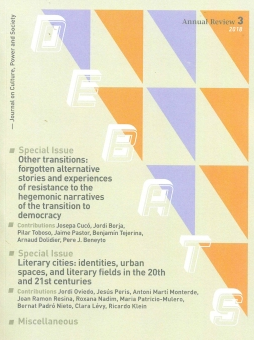An enchanted barcelona mirrored in fiction
Resumen
The novel is a product of the bourgeoisie’s interest in the empirical mastery of reality. From the start, writing on reality took a forking path. On one side, it became journalism; on the other, it took the form of the novel. But whereas journalism intervenes in the reality that it mediates, the novel focuses on the characters’ subjectivity. Journalism seeks to capture facts in their evanescence, while the novel lingers on the details of the milieu and the psychological folds of the action. Such attention to the temporality of events privileges urban space. As is the case in other literatures, the convergence of novel, journalism, and city is amply represented in Catalan novels, where Barcelona is the ostensible subject and the action a pretext for the author’s interest in minuting the broad facts of urban life. A significant number of contemporary novels about Barcelona use places and scenes that were previously mythologized. Their authors show fondness for a narrow strip of history covering about a century and a half. Locked within these temporal limits, the Catalan novel evinces little capacity to generate new myths. Neither the chronotope of the mythologized Barcelona of the 1980s nor those of the Rose of Fire or of the city under the dictatorship are of any use for the Barcelona that is now recovering from the deep economic crisis of the 2010s and leading the greatest political crisis of the post-Franco state. Entangled in historicism and in the cult of modernity, the novel is still seeking the narrative paradigm of the present time.Descargas
Descargas
Publicado
Cómo citar
Número
Sección
Licencia
Sin perjuicio de lo dispuesto en el artículo 52 de la Ley 22/1987 de 11 de noviembre de Propiedad Intelectual, BOE del 17 de noviembre de 1987, y conforme al mismo, los autores o autoras ceden a título gratuito sus derechos de edición, publicación, distribución y venta sobre el artículo, para que sea publicado en Debats. Revista de cultura, poder y sociedad.
Debats. Revista de cultura, poder y sociedad se publica bajo el sistema de licencias Creative Commons según la modalidad «Reconocimiento - NoComercial (by-nc): Se permite la generación de obras derivadas siempre que no se haga un uso comercial. Tampoco se puede utilizar la obra original con finalidades comerciales».
Así, cuando el autor o autora envía su colaboración, acepta explícitamente esta cesión de derechos de edición y de publicación. Igualmente autoriza a Debats. Revista de cultura, poder y sociedad, la inclusión de su trabajo en un fascículo de la revista para que se pueda distribuir y vender.











